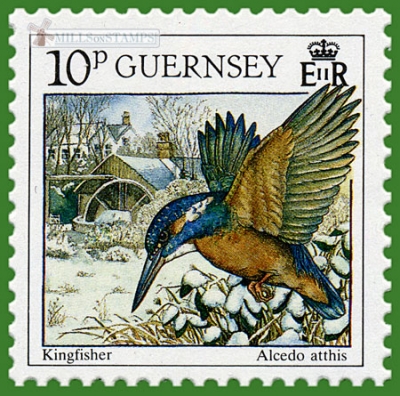-
Christmas. Winter birds
Guernsey 1990.10.16
In issue: Stamp(s): 12 Sheet(s): 1
Printing: offset
Issued in: mini-sheets of 12 stamps as one set
-
Number by catalogue: Michel: 512 Yvert: 514 Scott: 445l
Perforation type: 13 ¼x13 ¼
Subject:
10 pence. Kingfisher* on a watermill background
Additional:
*The Common Kingfisher, Alcedo atthis, also known as Eurasian Kingfisher or River Kingfisher, is a small kingfisher with seven subspecies recognized within its wide distribution across Eurasia and North Africa. It is resident in much of its range, but migrates from areas where rivers freeze in winter.
This sparrow-sized bird has the typical short-tailed, large-headed kingfisher profile; it has blue upperparts, orange underparts and a long bill. It feeds mainly on fish, caught by diving, and has special visual adaptions to enable it to see prey under water. The glossy white eggs are laid in a nest at the end of a burrow in a riverbank.
This species has the typical short-tailed, dumpy-bodied large-headed and long-billed kingfisher shape. The adult male of the western European subspecies, A. a. ispida has green-blue upperparts with pale azure-blue back and rump, a rufous patch by the bill base, and a rufous ear-patch. It has a green-blue neck stripe, white neck blaze and throat, rufous underparts, and a black bill with some red at the base. The legs and feet are bright red. It is about 16 cm (6.3 in) long with a wingspan of 25 cm (10 in), and weighs 34–46 g (1.2–1.7 oz).
The female is identical in appearance to the male except that her lower mandible is orange-red with a black tip. The juvenile is similar to the adult, but with duller and greener upperparts and paler underparts. Its bill is black, and the legs are also initially black.The flight of the Kingfisher is fast, direct and usually low over water. The short rounded wings whirr rapidly, and a bird flying away shows an electric-blue "flash" down its back.
In North Africa, Europe and Asia north of the Himalayas this is the only small blue kingfisher. In south and southeast Asia it can be confused with six other small blue-and-rufous kingfishers, but the rufous ear patches distinguish it from all but juvenile Blue-eared Kingfisher; details of the head pattern may be necessary to differentiate the two species where both occur.
The Common kingfisher has no song. The flight call is a short sharp whistle, chee, repeated two or three times. Anxious birds emit a harsh, shrit-it-it and nestlings call for food with a churring noise.________
This information has been taken from Wikipedia




